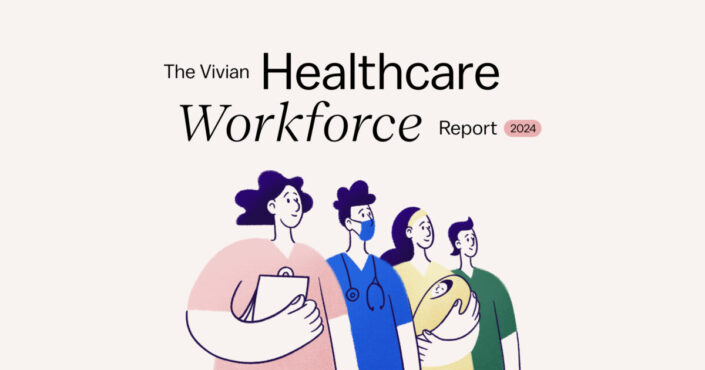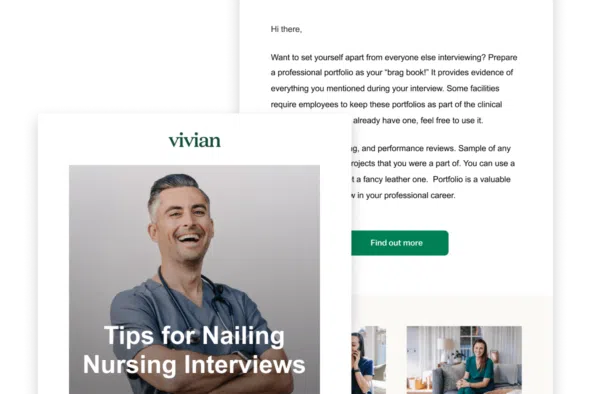We all know that the past few years have been a challenging time to work in healthcare. Although the pandemic is squarely in the rearview mirror, many clinicians continue to experience significant stressors at work against a backdrop of stagnant wages, family caregiving concerns and a rising cost of living. To gauge the current mood of the healthcare workforce, Vivian Health recently surveyed healthcare professionals (HCPs) about their most pressing issues and workplace concerns. We aimed to learn what HCPs like you consider when seeking new jobs or deciding whether to stay in their current roles.
Work and Life Challenges Persist for Healthcare Professionals
Healthcare’s transition from the frenzied pandemic era to a new normal hasn’t exactly been smooth. For one, when the Pandemic Health Emergency ended in May 2023, several regulatory waivers and funding enhancements for healthcare ended, putting pressure on the healthcare system. According to our survey responses, these adjustments come against a backdrop of the already elevated workforce stress stemming from high patient-to-staff ratios, workplace violence and a rising cost of living.
These issues are taking their toll and driving nurses and allied health professionals (AHPs) out of their healthcare careers. Consider the nursing profession: The National Council of State Boards of Nursing found that 100,000 registered nurses left the profession during the COVID-19 pandemic, and approximately 600,000 plan to leave by 2027. Ongoing departures from the healthcare workforce exacerbate a cycle of understaffed units and burnt-out employees.
Blues and Burnout for Healthcare Professionals

Our survey found that 72% of the HCPs who responded are experiencing substantial burnout, rating it 3, 4 or 5 out of a 5-point scale. If you feel that the situation isn’t improving, you aren’t alone: 71% of our respondents said their burnout was at least the same or worse in 2023 as the year prior, while only 29% felt it was improving.
Meanwhile, many clinicians are feeling the blues, especially younger HCPs. According to our survey, more than half of healthcare workers in the Millennial and Gen Z generations, which cover ages 18-42, have reported experiencing clinical depression in the past year. Specifically, 59% of Millennials and 56% of Gen Z reported experiencing depression, compared to 43% of Gen X (ages 42-58) and 36% of Baby Boomers (ages 59-68).
As our survey discovered, those younger generations are grappling acutely with financial challenges – see financial section below – that may contribute to their depression.
With AHP and nurse burnout and depression rampant, we discovered that HCPs are making substantial adjustments to their careers to get away from some sources of stress. Among our survey respondents, 42% said they were leaving healthcare entirely, 40% were taking more time off, 39% were moving to a less stressful specialty and 32% were shifting to fully remote healthcare work to avoid burnout.
RELATED: Learn more about telehealth salaries and find telehealth jobs near you.
While the choice to leave healthcare entirely may seem extreme, it may also come as no surprise to those in the trenches. Some 83% of our respondents report that their employers haven’t implemented any changes to address burnout. Thus, a question begging to be asked is what’s driving this burnout. Our respondents revealed two likely culprits.
Survey Reveals Violence and Understaffed Units Plague Healthcare
What could be causing burnout and depression for HCPs? Our survey respondents made clear that inadequately staffed units and workplace violence were significant problems in this field.
Violence on the Job

A staggering 47% of survey respondents said that they or one of their colleagues experienced workplace violence in 2023. Government data backs up these responses, which finds HCPs are five times more likely than other workers to experience workplace violence.
Violent incidents at healthcare jobs have become rampant in the news. Incidents range from a high-profile shooting of a social worker and nurse in Dallas to a combination kidnapping and murder of a nurse in Detroit. The violence expands beyond clinical staff, such as a hospital security guard killed at a Portland hospital.
While violence in healthcare typically comes from patients or their family members, a disturbing proportion of survey respondents said violence comes from their workplace peers (24%) or doctors (9%), suggesting that many units have become pressure cookers of ill tempers and unaddressed stress and anger.
Distressingly, almost half of those we surveyed (48%) said their employer hadn’t implemented safety protocols to protect them, and when they reported violence, 43% said the employer outright ignored the complaint.
Staffing Ratios Too High
Inadequate staffing and the challenges it creates on units may be one driver behind increased violence and burnout. Most survey respondents told us that staffing ratios in their unit have either stayed the same (47%) or worsened (39%) over the past year, with more patients per staff member. Just 14% report ratio improvements. Staffing ratios have become a top three issue for HCPs when considering a new job, with 65% saying they strongly agree that inadequate staffing will inspire them to leave a position.
Healthcare Professionals Want Support Beyond the Workplace

Burnout, violence and inadequate staffing ratios reflect a category of challenges HCPs face while on the job. However, our survey respondents also noted that difficulties from their personal lives spill over to affect their performance at work and their choice of employer. HCPs want more support from their employers to deal with these “personal” issues.
Financial Strains and High Cost of Living
Inflation remained stubbornly high in 2023, which has increased the cost of living against a backdrop of flat wages or even falling wages for travel nurses. Illustrating two approaches to handling rising costs, 60% of those surveyed have sought a higher-paying role due to inflation, while another 30% have moved to a place with a lower cost of living.
Meanwhile, to make up the difference between salaries and rising costs, many clinicians have turned to various “side hustles.” While about half of such side hustles are within the healthcare field, such as per diem work, many have tried other types of work, including gig roles, hospitality jobs or even entrepreneurship.
Financial pressures are particularly acute for younger HCPs. Members of Gen Z and Millennials were more likely to report maintaining side hustles or moving to areas with a lower cost of living as a result of inflation compared to Gen X and Baby Boomer participants in our survey.
Caregiving Responsibilities

Does this sound familiar? Just over half of our survey respondents note that in addition to their jobs, they are responsible for caring for children, elders or disabled family members. Nevertheless, half of our participants said their employer doesn’t do anything to assist with such caregiving, such as offering flexible hours, paid or unpaid parental leave or on-site childcare. Yet such support would have an extreme influence on where 36% of HCPs surveyed chose to work. This finding suggests a coveted job perk would be increased shift scheduling flexibility.
Let Vivian Help You Find Your Perfect Job
In this period of numerous challenges, where too few employers are adequately responding to the needs of their workforce, we know that many of you are on the lookout for better pay, a community with a lower cost of living and a workplace culture where management adequately addresses burnout, violence and staffing.
Vivian can help you find your ideal role, matching you with the right combination of pay, work-life balance, staffing levels and workplace culture. Join 1.7 million healthcare professionals who’ve already turned to Vivian to find the perfect job.









